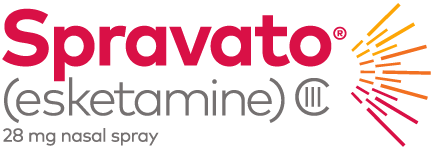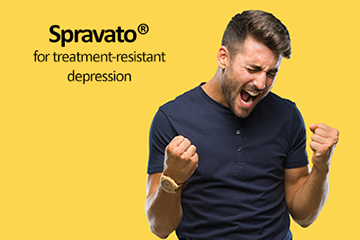More than 2,000 Spravato Sessions Conducted Since 2023
Traditional Oral Antidepressants not Enough?
Consider Spravato® — A Game Changer for Treatment Resistant Depression

What is Spravato?
Spravato is an FDA-approved form of ketamine (esketamine) used to treat adults whose depression has not improved with traditional medications. Spravato is a nasal spray, self-administered in a safe, supervised medical setting. It works differently from standard antidepressants, helping the brain form new connections that support mood and emotional balance. Spravato’s rapid mechanism can provide relief from depressive symptoms within hours to days, contrasting with the weeks or months needed for traditional antidepressants.
How will Spravato effect me?
Experientially, many people report visual imagery, an altered sense of self or ego, time distortion and spiritual or transpersonal experiences. Ketamine is not a classic psychedelic, but it creates a psychedelic-like state that can support therapeutic insight, emotional processing, and changes in neuroplasticity.
Win your battle against severe depression. Start by completing the Spravato Screening Questionnaire.

Why is Inspired my best choice?
Experience. Inspired has conducted more than 2,000 Spravato sessions since 2023. This ranks us among the top 10% of providers in the Kansas City area.
Environment. Your surroundings matter. We have intentionally designed our Spravato room as a spa-like experience, with comfortable recliners, soft music, low lighting, beautiful original artwork, and purifying plants. We want you to relax, be at peace and optimize the potential benefits of your Spravato experience. Most of our clients come in twice a month or more: It is important for you to feel at-home here.
Safety. Inspired utilizes a comprehensive safety protocol – including blood pressure checks before, during and after your session – to ensure your safety.
Compassion. At Inspired, we hire for warmth and professional excellence. Our core value is Caring People, Caring for People. You will experience that warmth from the moment you attend your initial psychiatric evaluation through every subsequent experience that you have at Inspired.
Convenience. Inspired offers multiple session times throughout the week. It will always be easy to book an appointment, which is important because most of our clients prefer to have treatments weekly or bi-weekly at times convenient for them.
Take charge of your depression now. Start by completing the Spravato Screening Questionnaire.
Why does Inspired offer both ketamine and Spravato?
Occasionally, insurance will not cover Spravato. Therefore, we offer ketamine treatments as an affordable alternative.
We find that ketamine provides a similar experience and outcome for our clients. Our ketamine protocol mirrors the Spravato protocol – safety, monitoring, two hours, done in a spa-like setting. One difference is that ketamine is self-administered as a troche (that is, a lozenge which dissolves under the tongue).
With the lozenges, there are NO NEEDLES. Most ketamine clinics administer ketamine intravenously, requiring needles and infusion. Our prices for ketamine are generally 15-20% less than most other ketamine clinics.

Is Spravato covered by insurance?
Yes, but IPC must open a prior authorization (PA) request with your insurance company. Each company has specific criteria for approval. Most require that you have tried at least two different antidepressants from two different drug classes for a minimum of 8 weeks. Some require that at least one antidepressant was augmented with a 2nd generation antipsychotic medication. Currently, we work with Blue Cross, Aetna, United, Cigna, Humana, and Medicare.
The easiest way to see if you are likely to get your prior authorization approved is to complete our Spravato Screening Questionnaire. It provides the criteria for each insurance company, and a list of about 30 antidepressants and other augmenting medications. If you have taken any of these in the past, you will probably recognize the names.
Start by completing the Spravato Screening Questionnaire.
How much does Spravato cost?
Because of a special arrangement with the manufacturer of Spravato® (Janssen), the most anyone on a commercial insurance plan will pay for the Spravato® medication is $10 per treatment. However, this is contingent on an approved prior authorization from your insurance company. The treatment sessions themselves are standard appointment types covered by insurance. Your cost for the sessions depends on your insurance plan and deductible.
And it’s affordable! To get started, complete the Spravato Screening Questionnaire.

Frequently Asked Questions about Spravato as a Medication
Is Spravato considered a psychedelic medication?
Spravato is a form of ketamine, which has been used as an anesthesia for surgeries, medical procedures, and pain management. Both ketamine and Spravato are considered psychedelics which should not be used without medical supervision.
What is a psychedelic?
A psychedelic is a type of psychoactive substance that alters perception, mood, and cognitive processes. These substances can induce hallucinations, changes in thought patterns, and heightened sensory experiences. Some psychedelics occur naturally, like psilocybin (found in magic mushrooms) and mescaline (from peyote cacti), while others, like LSD, ketamine and Spravato , are synthesized.
Psychedelics have been used in various cultural and religious ceremonies for centuries. More recently, they have gained attention for their potential therapeutic benefits, particularly in treating mental health conditions like depression, PTSD, and anxiety.
Why is Spravato used as a psychiatric medication?
Psychedelics open a window of neuroplasticity. This allows the brain to “rewire” negative beliefs and behavior patterns. In 2019, the Food and Drug Administration (FDA) approved Spravato for treatment resistant depression.
Spravato is one of the few FDA-approved psychedelic-related treatments, but it is not the only one. Ketamine itself is FDA-approved as an anesthetic, and esketamine (Spravato ) is approved for treatment-resistant depression.
Other psychedelics, like psilocybin and MDMA, are being studied for potential FDA approval, but they have not yet received full approval for medical use.
Is Spravato addictive?
Spravato is not considered physically addictive when used as prescribed under medical supervision. However, because it is related to ketamine—a substance known for its potential misuse—there are concerns about psychological dependence.
Spravato is administered in a controlled healthcare setting, meaning patients cannot take it home. This reduces the risk of misuse. While it does not typically lead to physical dependence like opioids, some individuals may develop a reliance on its effects for emotional relief.
How is Spravato different from traditional oral antidepressants?
Traditional antidepressants can take weeks to show effects, whereas Spravato may provide relief within hours or days. Unlike traditional antidepressants, Spravato is unlikely to cause weight gain, sexual dysfunction, and drowsiness (except during the session or shortly thereafter).
Traditional antidepressants are prescribed for mild to moderate depression, while Spravato is used for more severe treatment resistant depression (TRD). On a more technical level, traditional antidepressants such as SSRIs and SNRIS target serotonin and norepinephrine, while Spravato works on the glutamate system, which plays a crucial role in mood regulation.
Does Spravato cause a loss of appetite, weight gain, sexual dysfunction or drowsiness?
Loss of appetite, weight gain, sexual dysfunction and drowsiness are not officially listed as common side effects of Spravato. However, drowsiness is likely to occur during Spravato treatments but not afterwards. If you experience any of these conditions while using Spravato, it might be worth discussing with your healthcare provider.
What are the most common side-effects of Spravato?
Spravato is a nasal spray used to treat depression, but it comes with some common side effects. The side effects occur during treatment and generally dissipate that day. These include dizziness, nausea, vomiting, sedation (excessive sleepiness), vertigo (a spinning sensation), and dissociation (feeling detached from reality). Some people also experience altered taste, dry mouth, headache, anxiety, and nose or throat irritation.
Are there health conditions in which Spravato should NOT be used?
Spravato has certain FDA-label contraindications which means that we cannot prescribe Spravato for you if you have a health history which includes certain conditions.
These conditions include:
- Aneurysmal vascular disease (thoracic and abdominal aorta, intracranial, and/or peripheral arterial vessels).
- History of intracerebral hemorrhage Arteriovenous malformation
- Hypersensitivity to esketamine, ketamine or any of the excipients.
If you are uncertain about any of these conditions, please make your provider at IPC aware of this.
Details like these are covered in the Spravato Screening Questionnaire, your first step toward getting treated.

